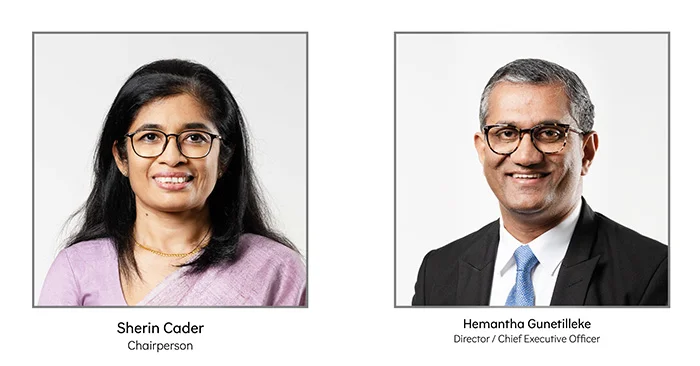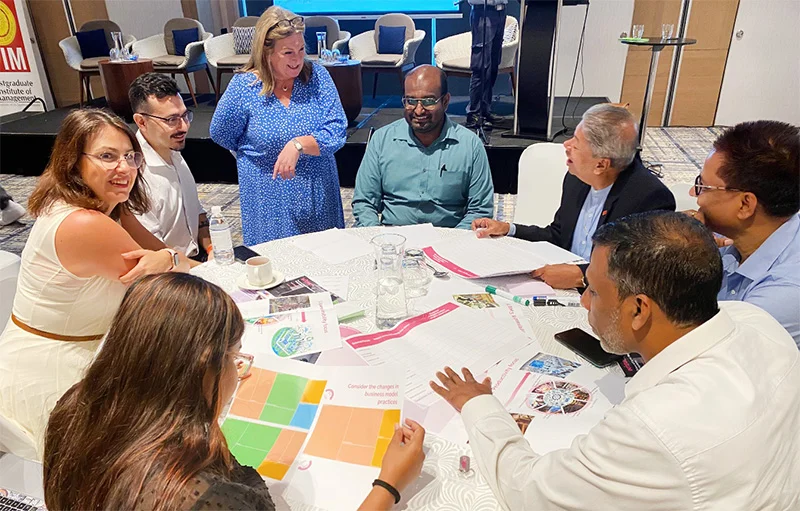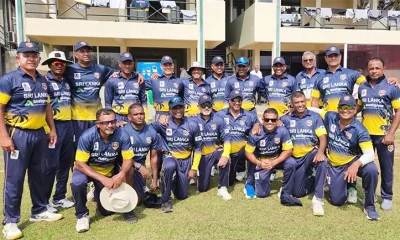Business
Commercial Leasing and Finance contributes 154 points to bourse

By Hiran H.Senewiratne
CSE trading activities kicked off yesterday with a market downturn but later indicated an exceptional interest in Commercial Leasing and Finance stocks. Consequently, the All-Share Price Index shot up to a comfortable territory, stock market analysts said.
The market began the penultimate month of 2021 on a negative note amid lacklustre investor sentiment triggered by political undercurrents and external concerns. But due to the low interest regime people are quite enthusiastic to invest in stocks. However, yesterday, Commercial Leasing and Finance being the main performer in the market, contributed 154 points to the stock market. Its share prices increased by 22 percent or Rs 10.80. Its shares started trading at Rs 48.20 and at the end of the day they shot up to Rs 59. Since the company is an index heavy entity, its stocks are sought after in the stock market for trading purposes, market analysts said.
Amid those developments, the All Share Price Index went up by 139.59 points and the S&P SL20 Index rose by 6.08 points, while turnover was Rs. 4.4 billion involving 117 million shares and the number traded was 34000. During the day three crossings were reported and those crossings were, Melstacorp 6.5 million shares crossed to the tune of Rs 370.5 million, its shares traded at Rs 57, Elpitiya Plantations 500,000 shares crossed to the tune of Rs 52.5 million, its shares traded at 105 and Sunshine Holdings one million shares crossed for Rs 27 million, its shares fetching Rs 27.
In the retail market top five companies that mainly contributed to the turnover were; Expolanka Holdings Rs 1 billion (five million shares traded), Commercial Leasing and Finance Rs 396 million (7.2 million shares traded), Browns Investments Rs 215 million (20 million shares traded), Royal Ceramic Rs 166 million (2.9 million shares traded) and Central Industries Rs 163 million (one million shares traded).
The lacklustre investor interest or their being on the sidelines was despite the release of impressive corporate earnings so far. Nevertheless, macro concerns remain; hence, less enthusiasm yesterday, though some believe there will be a fresh round of buying ahead of the presentation of budget 2022.
It said high net worth and institutional investor participation was noted in selected stocks, such as, Sampath Bank and Commercial Bank. Mixed interest was observed in Expolanka Holdings, Royal Ceramics and Commercial Leasing and Finance.
Yesterday the US dollar was quoted at Rs 202.49 as per the Central Bank controlled price to prevent escalation of prices in essential goods.
Business
CEB urged to revise Draft Long Term Generation Expansion Plan, in view of renewable energy needs

By Ifham Nizam
The Public Utilities Commission of Sri Lanka (PUCSL) has instructed the Ceylon Electricity Board (CEB) to revise its Draft Long-Term Generation Expansion Plan (LTGEP) 2025-2044, incorporating more robust projections for renewable energy and battery storage, while also reassessing LNG infrastructure and procurement strategies.
The Island Financial Review reliably learns PUCSL Director General Damitha Kumarasinghe emphasized the need for “more robust and realistic cost assumptions for Renewable Technologies and Battery Energy Storage Systems (BESS).”
The Commission stressed that BESS should be valued not just as a renewable integration tool but also for its potential to mitigate power shortages.
The directive also calls for revisions in LNG infrastructure planning, including “a comprehensive analysis covering LNG fuel cost calculation, infrastructure development, procurement contracting options, and risks associated with supply and procurement.” PUCSL has specifically highlighted the importance of evaluating the financial and economic feasibility of a natural gas pipeline from Kerawalapitiya to Kelanitissa.
Kanchana Siriwardena, Deputy Director General – Industry Services, reinforced the Commission’s stance on renewable energy, stating that “further reductions in renewable energy curtailment should be explored by incorporating more BESS.”
The PUCSL’s instructions also mandate incorporating clauses from the Memorandum of Understanding (MoU) with Petronet India, which includes a temporary LNG supply for the Sobadhanavi Plant. The revised LTGEP must also factor in infrastructure costs related to the Floating Storage Regasification Unit (FSRU) and pipeline networks as part of the overall LNG cost calculation.
The CEB is expected to resubmit the revised plan for PUCSL’s approval, ensuring alignment with Sri Lanka’s long-term energy security and sustainability goals.
The PUCSL directive also calls for a comprehensive evaluation of various LNG procurement options and associated risks. These include:
LNG infrastructure development and expansion
Contracting options for LNG procurement
Risks related to LNG supply and procurement stability
Robustness of natural gas demand calculations
Economic feasibility of the proposed natural gas pipeline from Kerawalapitiya to Kelanitissa, given the low plant factors of power stations at Kelanitissa.
Business
Nations Trust Bank ends 2024 with strong performance, achieving 24% ROE

Nations Trust Bank PLC reported strong financial results for the twelve months ending 31st December 2024, achieving a Profit After Tax (PAT) of LKR 17 Bn, up 46% YoY.
Nations Trust Bank, Director & Chief Executive Officer, Hemantha Gunetilleke, stated, “The Bank’s performance for the twelve months ending 31st December 2024 showcases our continued growth and expansion across diverse customer segments. Our solid capital position, strong liquidity buffers, effective risk management frameworks, and steadfast commitment to service excellence and digital empowerment remain the key drivers of our success.”
Improvements in the macro-economic environment and successful management of the Bank’s credit portfolio resulted in total impairment charges decreasing by 69% and the Net Stage 3 ratio reducing to 1.6%.
The Bank’s financial performance is supported by its strong capital buffers, with Tier I Capital at 21.47% and a Total Capital Adequacy Ratio of 22.66%, well above the regulatory requirements of 8.5% and 12.5%, respectively.
A strong liquidity buffer was maintained with a Liquidity Coverage Ratio of 320.56% against the regulatory requirement of 100%.
The Bank reported a Return on Equity (ROE) of 24.22%, while its Earnings Per Share for the twelve months ending 31st December 2024 increased to LKR 50.82, against LKR 34.70 recorded during the same period last year.
Nations Trust Bank PLC serves a diverse range of customers across Consumer, Commercial and Corporate segments through multi-channel customer touch points spanning both physical and digital. The Bank is focused on digital empowerment through cutting-edge digital banking technologies, and pioneered FriMi, Sri Lanka’s leading digital banking experience. Nations Trust Bank PLC is an issuer and sole acquirer of American Express Cards in Sri Lanka with market leadership in the premium segments.
Business
Modern Challenges and Opportunities for the Apparel Industry: JAAF drives industry dialogue

The Joint Apparel Association Forum (JAAF), in collaboration with Monash Business School and the Postgraduate Institute of Management (PIM) successfully hosted the International Conference on the Apparel Industry 2025 recently in Colombo. This was the second time the event was held, following its inaugural edition in 2018, as part of JAAF’s commitment to fostering dialogue and collaboration within the global apparel sector.
Themed “Modern Challenges and Opportunities for the Apparel Industry”, the three-day event brought together industry leaders, academics, and sustainability experts to discuss pressing issues such as ESG (Environmental, Social, and Governance) compliance, circular economy strategies, technological advancements, and workforce transformation.
A key highlight of the event was the panel discussion on “Current Actions and Their Impact on ESG-Related Outcomes in the Apparel Industry,” featuring:
Felix A. Fernando – CEO, Omega Line Ltd.
Nemanthie Kooragamage – Director Group Sustainable Business, MAS Holdings
Gayan Ranasinghe – Control Union,
Chamindry Saparamadu – Director General/CEO, Sustainable Development Council
Pyumi Sumanasekara – Principal Partner, KPMG Sri Lanka
Discussions emphasized how Sri Lanka’s apparel industry is adapting to global ESG standards, incorporating sustainable production methods, and aligning with evolving regulatory frameworks.
-

 Business2 days ago
Business2 days agoSri Lanka’s 1st Culinary Studio opened by The Hungryislander
-

 Sports6 days ago
Sports6 days agoSri Lanka face Australia in Masters World Cup semi-final today
-

 Sports3 days ago
Sports3 days agoHow Sri Lanka fumbled their Champions Trophy spot
-

 News6 days ago
News6 days agoCourtroom shooting: Police admit serious security lapses
-

 News6 days ago
News6 days agoUnderworld figure ‘Middeniye Kajja’ and daughter shot dead in contract killing
-

 News5 days ago
News5 days agoKiller made three overseas calls while fleeing
-

 News4 days ago
News4 days agoSC notices Power Minister and several others over FR petition alleging govt. set to incur loss exceeding Rs 3bn due to irregular tender
-

 Features3 days ago
Features3 days agoThe Murder of a Journalist











